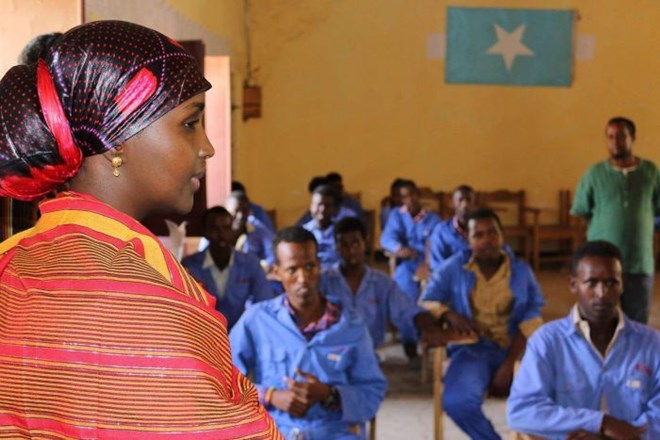Somali female presidential hopeful defies critics and vows to stay in politics

Casting her bright yellow scarf over her golden Somali “dirac” gown, Fadumo Dayib speaks in a hushed tone.
But as the first woman to run for president in Somalia, she means to be heard.
“The more I get threats, the more I get insults … the more I’m convinced that I’m doing the right thing,” she told the Thomson Reuters Foundation at a conference in London.
Dayib knows about hardship. She was born in a refugee camp in Kenya, and her mother lost 11 of her siblings – all to preventable diseases. Her family and millions of others were forced back to Somalia, before they fled civil war to Finland.
She learnt to read and write only as a teenager and now boasts degrees from Harvard University and the University of Helsinki.
After a long international career in public health, Dayib decided to enter the Somali political fray in 2014, ruffling feathers as she did so.
“They really know that if I were to come into office I would make a change,” said Dayib, who has received death threats and ridicule from critics in Somalia and among the diaspora.
A fragile country shattered by more than two decades of conflict, Somalia is grappling with huge issues from famine and drought to al Shabaab militants.
Dayib did not succeed in her quest to win the presidency. She dropped out of the race, and Mohamed Abdullahi “Farmajo” Mohamed, a dual U.S.-Somali citizen and former prime minister, was elected president on Feb 8., in a process in which around 14,000 clan elders and traditional leaders chose lawmakers, who then selected the president.
The new president has yet to confirm his cabinet.
“I’m not in it,” Dayib said, despite rumours that she may be appointed to a leading role, such as foreign minister.
She said there had been progress in the acceptance of women in Somalia’s male-dominated politics.
“Initially there was a lot of resistance and a lot of negativity but now even when I see Somalis on the street the first thing they do is call me ‘madam president’ – from being laughed at in 2014,” said Dayib. “We’ve come a long way.”
Despite quitting the presidential race, citing bribery and corruption pressures, Dayib thinks that simply declaring her candidacy instigated a movement among Somali women, who are engaging with politics and demanding rights.
Somalia has nearly hit its ambitious 30 percent quota for female representation in parliament, with 28 percent of lawmakers now women, said Dayib.
The trend is rapidly spreading across Africa too, she said.
“African women have always had informal leadership,” she said, adding that now women were seeking formal recognition of their roles.
“African women don’t talk, they act.”
Exuding a quiet confidence, Dayib is focused on the future.
“I’m going to run, I’m going to be in politics and I’m going to be even more vocal than I have been,” she said.
“I’m here to stay.”
Reuters